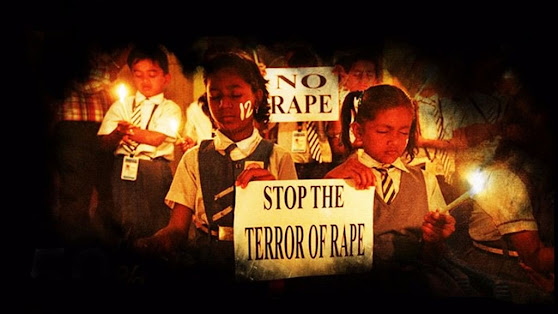Rape And Child Abuse Awareness (By Yuvraj Kumar Meena)
Rape And Child Abuse Awareness
What is Rape?
Rape is a type of sexual assault usually involving sexual intercourse or other forms of sexual penetration carried out against a person without that person's consent. The act may be carried out by physical force, coercion, abuse of authority, or against a person who is incapable of giving valid consent, such as one who is unconscious, incapacitated, has an intellectual disability, or is below the legal age of consent The term rape is sometimes used interchangeably with the term sexual assault.
The ways you can stand against rape culture -
“She was drunk.”
“Women say “no” when they mean “yes.”
Rape culture is pervasive. It’s embedded in the way we think, speak, and move in the world. While the contexts may differ, rape culture is always rooted in patriarchal beliefs, power, and control.
Rape culture is the social environment that allows sexual violence to be normalized and justified, fueled by the persistent gender inequalities and attitudes about gender and sexuality. Naming it is the first step to dismantling rape culture.
Every day we have the opportunity to examine our behaviors and beliefs for biases that permit rape culture to continue. From the attitudes we have about gender identities to the policies we support in our communities, we can all take action to stand against rape culture.
Here are Few you can do your part:
1.Create a culture of enthusiastic consent.
Freely given consent is mandatory, every time. Rather than listening for a “no,” make sure there is an active, “yes,” from all involved. Adopt enthusiastic consent in your life and talk about it.
2. Speak out against the root causes.
Rape culture is allowed to continue when we buy into ideas of masculinity that see violence and dominance as “strong” and “male”, and when women and girls are less valued.
It is also underpinned by victim-blaming—an attitude that suggests a victim rather than the perpetrator bears responsibility for an assault.
When discussing cases of sexual violence, a victim’s sobriety, clothes, and sexuality are irrelevant. Instead, counter the idea that men and boys must obtain power through violence and question the notion of sex as an entitlement.
3.Know the history of rape culture.
Rape has been used as a weapon of war and oppression throughout history. It has been used to degrade women and their communities and for ethnic cleansing and genocide.
There are no quick reads for this. You can start by learning about the use of sexual violence during past and recent conflicts, such as in the Democratic Republic of Congo, the Guatemalan civil war, or the Kosovo conflict.
4. Don’t laugh at rape.
Rape is never a funny punchline. Rape jokes delegitimize sexual violence, making it harder for victims to speak up when their consent is violated.
Humour that normalizes and justifies sexual violence is not acceptable. Call it out.
5. Educate the next generation.
It’s in our hands to inspire the future feminists of the world. Challenge the gender stereotypes and violent ideals that children encounter in the media, on the streets, and at school. Let your children know that your family is a safe space for them to express themselves as they are. Affirm their choices and teach the importance of consent at a young age.
How To Keep Your Child Safe-
You certainly cannot scare your kids into not wanting her to go to school or telling her about how unsafe the sweetest corner of her house can get because of the fear that they might get raped and also killed.
At the same time, you don’t want them to take for granted that the staff in school or people at home can keep them protected. So, it makes sense to educate your kids about good touch and bad touch. But don’t overburden them with too much information.
The first most important thing for any child is ‘safety begins with sharing’. Child counselor and psychotherapist from Mumbai Padma Reewari said, “Voice out and reach out is what you should teach your child. The moment the child is aware that he or she is getting bullied physically, the child should bring it to the parent's or teachers' notice. The parent or the adult the child is sharing with has to be open to listening to the child and addressing the problem immediately.”
Making your child aware of physical abuse should start at home but in a subtle way. Weave it in the course of communication and don’t make it sound too scary and serious. The idea is to make your child aware of the happenings around him/her.
Tell them that no stranger or anyone close in the family is supposed to touch private areas of the body. Communicate with him/her about molestation and rape and how it happens. If your child is asking questions about rape and molestation, answer them patiently and discreetly."Don’t brush conversations under the carpet.”
Emotional Connect -
It is very important to be emotionally attuned with your child. The more emotional connect, you have with your child, the more the child forms a safety net at home that helps her to confide everything in you.
“Monitor your child’s activities. If your child is complaining about some stranger following them, make sure you take cognizance of the situation. Don’t dismiss it, make sure the child is not talking or interacting with unknown people on social media. Keep track of their whereabouts,” Hingorrany added.





Thats the great thinking
ReplyDeleteHope people inspired from your content
ReplyDeleteWow
ReplyDeleteGreat work
ReplyDeleteKeep it up 🙂
Great work
ReplyDeleteYou have done a great a work bro. Hope people will inspire from these words and these type of cruel activities will not happen in future.
ReplyDeleteGreat!
ReplyDeleteWow!! Impressive. Someone spilled the reality.��
ReplyDelete